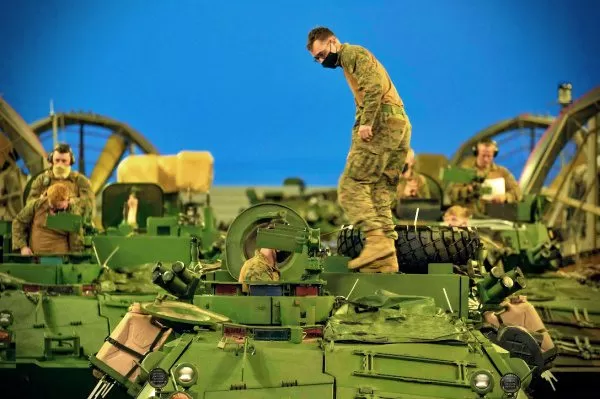Discovery obligations in a military court-martial
Documents and tangible objects
Documents and tangible objects (after service of charges). RCM 701(a)(2)(A).
Books, papers, documents, photographs, tangible objects, buildings, or places
Books, papers, documents, photographs, tangible objects, buildings, or places, AND In the possession, custody, or control of military authorities, AND Either intended for use by the trial counsel as evidence in the case-in- chief OR material to the preparation of the defense. Unlike RCM 701(a)(6) and Brady, this matter does not have to be favorable – just material to the preparation of the defense. Unfavorable matter can be material to the preparation of the defense. See United States v. Adens , 56 M.J. 724 (Army Ct. Crim. App. 2002). The definition of “material” in Black’s Law Dictionary includes matter that is of “such a nature that knowledge of the item would affect a person’s decision-making process.” Black’s Law Dictionary 1066 (9th ed. 2009).The decisions might how to plead (see generally United States v. Adens , 56 M.J. 724 (Army Ct. Crim. App. 2002).
- Discovery and Expert Assistance under the UCMJ
- Appointment and Production of Expert Assistance
- Appointment and Production of Expert Witnesses
- Discovery and trial advocacy
- Defense Discovery Responsibilities and Requests
- Disclosures or notices made upon government request (not based on reciprocity)
- Mandatory disclosure or notice requirements for defense counsel
- Discovery in the Military Justice system
- Government requests for discovery
- Mandatory disclosure or notice requirements for trial counsel
- Introduction to discovery in the military
- Duty to preserve evidence
- Enforcement
- Regulation of production of witness and evidence under the UCMJ
- Regulation of Discovery
- Protective and modifying orders
- Remedies for Nondisclosure
United States v. Trigueros , 69 M.J. 604, 611 (A. Ct. Crim. App. 2010)) or to pursue lines of investigation, defenses, or trial strategies ( United States v. Eshalomi , 22 M.J. 12, 27 (C.M.A. 1986). United States v. Webb, 66 M.J. 89 (C.A.A.F. 2008)). Evidence might be material if the defense could use it to persuade the convening authority not to refer the case.United States v. Eshalomi, 22 M.J. 12, 28 (C.M.A. 1986)). There is no requirement that “material” matters be known to be admissible at trial or that the government intend to introduce it. See United States v. Luke, 69 M.J. 309 (C.A.A.F. 2011).
Where the defense makes a specific discovery request and the government fails to disclose that evidence, or where there is prosecutorial misconduct, the standard of review is harmless beyond a reasonable doubt. United States v. Roberts, 59 M.J. 323 (C.A.A.F. 2004). Some of the military judge’s decisions are reviewed under the abuse of discretion standard. A military judge abuses her discretion when her factual findings are clearly erroneous or she applies the wrong law. Next, the appellate courts review the decision that the matter is “material to the preparation of the defense” under a de nevo standard. If the appellate court finds that the material should have been disclosed, then the appellate courts apply “harmless beyond a reasonable doubt” to test for prejudice.
Roberts , 59 M.J. at 326.
Courts often incorrectly confuse this analysis with Brady analysis. See United States v. Figueroa 55 M.J. 525 (A.F. Ct. Crim. App. 2001). The obligations under RCM 701(a)(2) are in addition to the obligations found under Brady.
Trial counsel’s duty to search
Trial counsel’s duty to search. The government must make good faith efforts to comply with the requests. United States v. Williams, 50 M.J. 436, 441 (C.A.A.F. 1999). “The government cannot intentionally remain ignorant and them claim it exercised due diligence.” United States v. Trigueros , 69 M.J. 604, 611 (A. Ct. Crim. App. 2010).
Trial counsel’s rebuttal evidence on the merit
Trial counsel’s rebuttal evidence on the merits. Government must disclose evidence that is “material to preparation of defense” under R.C.M. 701(a)(2) regardless of “whether the government intends to offer the evidence in its case-in-chief, in rebuttal, or not at all.” United States v. Adens , 56 M.J. 724 (Army Ct. Crim. App. 2002).
In Adens , the government knew the defense theory of the case and knew of evidence that was unfavorable to that defense; did not present that evidence during a direct examination but instead waited for the defense to cross- examine a government witness based on the defense theory; then the government introduced the evidence in re-direct examination of that witness. While stating that RCM 701(a)(2) includes rebuttal evidence, the court noted that technically this evidence was introduced in the government case-in-chief. Because this failure to disclose was pursuant to a specific request, court reviewed under the harmless beyond a reasonable doubt standard, found material prejudice existed, and reversed.
“A trial counsel who holds back material evidence for possible use in rebuttal to ambush the defense runs a risk . . . In the exercise of that control, a military judge is entitled to exclude prosecution evidence in rebuttal, if the judge concludes that it should have been offered in the prosecution case-in-chief . . .” United States v. Murphy, 33 M.J. 323 (C.M.A. 1991).
Reports (after service of charges). RCM 701(a)(2)(B)
Reports (after service of charges). RCM 701(a)(2)(B).
Results or reports of physical or mental examinations, and of scientific tests or experiments
Results or reports of physical or mental examinations, and of scientific tests or experiments, AND In the possession, custody, or control of military authorities, AND Either intended for useby the trial counsel as evidence in the case-in- chief OR material to the preparation of the defense;
United States v. Jackson, 59 M.J. 330 (C.A.A.F. 2004). Defense counsel specifically requested “any reports, memos for record or other documentation relating to Quality Control and/or other documentation relating to Quality Control and/or inspections pertaining to quality control at the Brooks Lab for the three quarters prior to [the accused]’s sample being tested, and the available quarters since [the accused]’s sample was tested.” The lab failed to identify a blind quality control sample by reporting a negative sample as a positive less than four months after the accused’s sample was tested and less than three months after the defense’s request. The trial counsel failed to discover and disclose the report to the defense. That failure violated the accused’s rights under RCM 701(a)(2)(B). The CAAF found prejudice because had the information been disclosed, the defense could have used the information to demonstrate the existence of quality control problems.
Sentencing information (upon request). RCM 701(a)(5)
Sentencing information (upon request). RCM 701(a)(5).
Written material that will be presented by the prosecution
Written material that will be presented by the prosecution during the presentencing proceedings. (1) Trial counsel are not required to written matters intended to be offered in rebuttal of an accused’s presentencing case where the matter could not have been offered during government’s presentencing case. United States v. Clark , 37 M.J. 1098 (N.M.C.M.R. 1993).
Names and addresses of witnesses the trial counsel intends to call
Names and addresses of witnesses the trial counsel intends to call during the presentencing proceedings. (1) The Rules of Practice, at 21, requires notice ten days prior to trial and do not require a defense request for this information.
Notice of uncharged misconduct
Notice of uncharged misconduct (reasonable notice in advance of trial). MRE 404(b).
Upon defense request, the government must provide pretrial notice of the general nature of evidence of other crimes, wrongs, or acts which it intends to introduce at trial.
Statements by a witness that has testified (after testimony). RCM 914.
Statements by a witness that has testified (after testimony). RCM 914. A witness, not the accused, testifies. Upon a motion by the party who did not call the witness, the judge shall order disclosure of any “statement” by the witness that relates to the subject of his testimony. RCM 914 is a counterpart to the Jencks Act, 18 U.S.C. § 3500. Much of what the government would have to disclose to the defense under RCM 914 will also fall under other discovery rules like RCM 701(a)(1, 2, 6) and Brady. (1) Under RCM 701(a)(1), for example, the government must disclose all sworn or signed statements relating to a charged offense.
A statement is a “written statement by the witness that is signed, adopted or approved by the witness.” Includes a substantially verbatim account of an oral statement made by the witness that is recorded contemporaneously with the oral statement. See United States v. Holmes , 25 M.J. 674 (A.F.C.M.R. 1987).
CID Agent investigator notes
CID Agent investigator notes. If the agent testifies or if a witness who has reviewed and approved the agent’s notes testifies, the notes must be produced under this rule.
See Goldberg v. United States , 425 U.S. 94 (1976) and United States v. Smaldone , 484 F. 2d 311 (10th Cir. 1973). If the agent does not testify, then the defense will have to look to another rule to seek discovery.
Article 32 testimony
United States v. Lewis , 38 M.J. 501 (A.C.M.R. 1993). CID agent testifies at trial. Defense motion to strike because tape recordings of his Article 32 testimony erased by legal clerk. The trial judge correctly denied the motion when the accused failed to show that the government acted in bad faith causing the destruction or loss of the Article 32 tapes and the agent’s testimony was internally consistent and corroborated by other witnesses.
United States v. Marsh, 21 M.J. 445 (C.M.A. 1986). The Jencks Act applies to courts-martial and to statements made by witnesses at an Article 32 Investigation. Negligent loss of Article 32 tapes, without any intent to suppress, does not require the court to strike the testimony of the witness.
Administrative board hearings
Administrative board hearings.United States v. Staley, 36 M.J. 896 (A.F.C.M.R. 1993). Military judge found that statements made by witnesses before an administrative discharge board were within the general mandate of RCM 914. Destruction of the tape recording of the testimony was in good faith; thus, exclusion of the witnesses’ testimony was not required.
Confidential informant’s notes
Confidential informant’s notes. United States v. Guthrie, 25 M.J. 808 (A.C.M.R. 1988). No Jencks Act violation when a handwritten statement was destroyed after a typed version was created and adopted by the witness. United States v. Douglas, 32 M.J. 694 (A.F.C.M.R. 1991). An informant did not keep his notes about an investigation. Lesson to be learned: “Whenever military law enforcement agents request that an informant prepare written notes regarding an on-going investigation, those notes should be obtained from the informant and included in the investigative case file.”Id. at 698 n.2.
Remedy for non-disclosure
Remedy for non-disclosure. “The military judge shall order that the testimony of the witness be disregarded by the trier of fact and that the trial proceed, or, if it is the trial counsel who elects not to comply, shall declare a mistrial if required in the interest of justice.” RCM 914(e).
Writings used to refresh memory
Writings used to refresh memory (while testifying, or before testifying if the judge determines it is necessary in the interest of justice). MRE 612.
Remedy for non-disclosure. “The military judge shall make any order justice requires, except that when the prosecution elects not to comply, the order shall be one striking the testimony . . . or a mistrial.”
Inconsistent prior statements
Inconsistent prior statements (on request). MRE 613(a).



